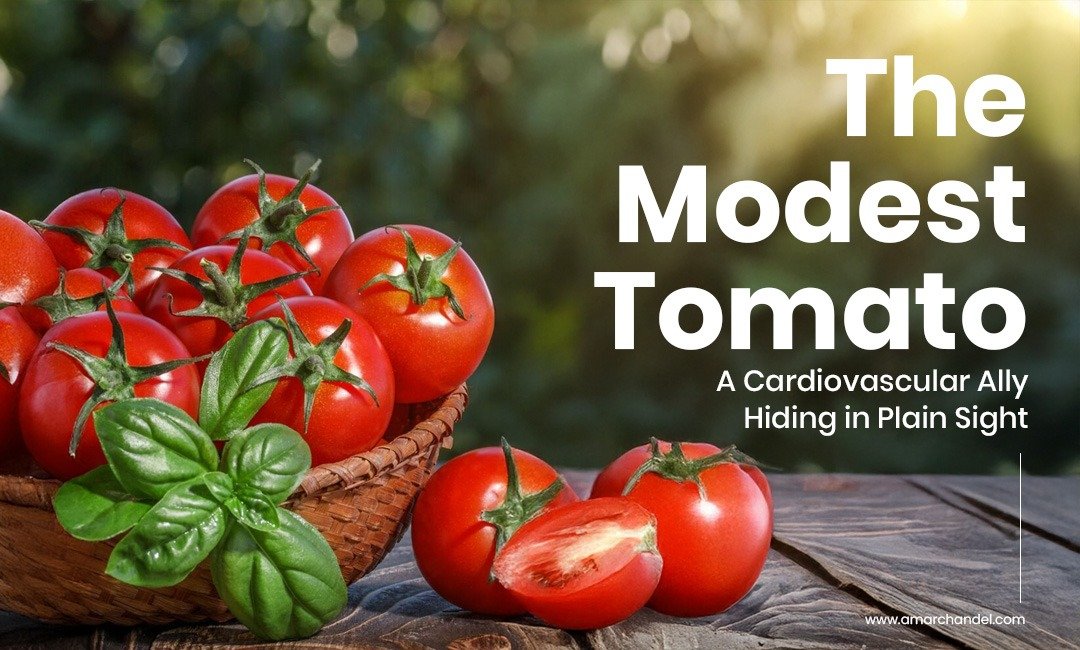In a world obsessed with pharmaceutical solutions, the humble tomato offers a profound reminder: Sometimes, nature’s simplest gifts hold the most complex and potent benefits.
Whether eaten raw, cooked, or juiced, particularly when the precious seed-rich gel is preserved, tomatoes can serve as a natural adjunct to heart health — reducing platelet overactivity, guarding against inflammation, and helping stave off the world’s leading killer.
As research continues to evolve, one truth stands clear:
The fork may yet prove mightier than the pill.
In the intricate battle against cardiovascular disease (CVD), fruits and vegetables have long been hailed as protective allies — their antioxidants shielding our arteries from oxidative damage and their fibre aiding metabolic health. Yet, beyond these familiar virtues lies a lesser-known but equally critical benefit: the ability of certain plant compounds to inhibit platelet activation — a pivotal factor in both thrombosis and inflammation.
Historically, platelets were seen as mere mediators of clot formation. Today, however, we know they play a far more insidious role — actively contributing to the initiation, progression, and rupture of atherosclerotic plaques (Gawaz et al., Circulation Research, 2022). Their hyperactivity is not just a matter of clotting but fuels the chronic inflammation that underpins atherosclerosis — a process that begins alarmingly early in life. Autopsy studies confirm that atherosclerotic changes can be seen in adolescents in industrialised societies (Strong et al., JAMA, 1999).
Suppressing platelet overactivity may thus protect not only against heart attacks and strokes but also against cancer, allergies, and other inflammatory disorders where platelet-derived mediators play a harmful role (Lievens & von Hundelshausen, Nature Reviews Immunology, 2021).
The Unsuspected Anti-Platelet Power of Fruits and Vegetables
While the antioxidant prowess of fruits and vegetables is celebrated, their influence on platelet function is only now gaining recognition. Numerous studies confirm that common fruits and vegetables harbour bioactive compounds capable of modulating platelet activation and aggregation — effects potent enough to interfere with platelet function tests (Koutsos et al., Critical Reviews in Food Science and Nutrition, 2023).
And the effects aren’t fleeting: even brief fasting may not fully negate these bioactive influences before medical testing.

The Tomato: Nature’s Potent Platelet Modulator
Among 16 fruits evaluated in controlled studies, tomatoes emerged as the frontrunner in inhibiting platelet aggregation (O’Kennedy et al., American Journal of Clinical Nutrition, 2017). Unlike some compounds that degrade with cooking or require dietary fat for absorption, the anti-platelet agents in tomatoes are water-soluble, heat-stable, and — intriguingly — concentrated in the yellow gel surrounding the seeds.
This makes tomato pomace — the industrial byproduct of tomato processing (seeds and peels) — a hidden treasure of cardiovascular benefit, far surpassing tomato juice, sauce, or ketchup in platelet-inhibiting potency.
From Test Tube to Human Trials: Do Tomatoes Really Work?
Laboratory findings transitioned impressively into human trials:
• In a randomised controlled study on type 2 diabetics, participants consuming a daily glass of tomato juice for three weeks showed a significant reduction in platelet aggregation (Lycett et al., Platelets, 2018).
• Healthy volunteers, too, demonstrated notable suppression of platelet activation within three hours of consuming tomatoes, with a dose-dependent response — two tomatoes worked well; six worked even better (O’Kennedy et al., European Journal of Clinical Nutrition, 2017).
• Tomatoes influenced multiple pathways of platelet activation, unlike aspirin, which targets a single pathway. Astonishingly, while 25% of people exhibit aspirin resistance, only 3% showed resistance to tomato bioactives in clinical settings.
Importantly, consuming tomatoes did not prolong clotting times, suggesting they offer a sweet spot — dampening unwanted platelet activation without increasing bleeding risk, a major limitation of drugs like aspirin.
Tomatoes, Atherosclerosis, and Cardiovascular Outcomes
Epidemiological studies further bolster the case for tomatoes.
• Regular tomato consumption correlates with lower incidence of acute coronary events, reduced early atherosclerosis progression, and decreased heart disease mortality (Grosso et al., Critical Reviews in Food Science and Nutrition, 2020).
• Lycopene, abundant in tomatoes, also shows anti-inflammatory and endothelial-protective properties, adding another layer to cardiovascular defense (Petyaev & Bashmakov, Oxidative Medicine and Cellular Longevity, 2022).

What About Other Fruits?
• Kiwifruit has shown promising anti-platelet activity both in vitro and in human studies, with two kiwis a day reducing platelet aggregation and lowering blood triglycerides (Richardson et al., Platelets, 2020).
• Strawberries and grapefruits also show some activity, though the latter’s interaction with medications makes it less ideal. However, evidence for kiwis translating into hard cardiovascular outcomes remains sparse compared to tomatoes.
Recent meta-analyses continue to support the role of tomato-derived bioactives as functional foods for platelet modulation, suggesting potential for dietary strategies to complement conventional antiplatelet therapy (Silva et al., Nutrients, 2023).
Even the European Food Safety Authority (EFSA) recognised the evidence as strong enough to allow health claims related to tomato extract’s platelet aggregation inhibition (EFSA Journal, 2009) — a rare endorsement in the conservative world of functional food regulation.
References
• Gawaz M, Voigt I, Borst O. Platelets in inflammation and atherogenesis. Circulation Research. 2022;130(9):1261-1283.
• O’Kennedy N, Duss R, et al. Effects of tomato extract on platelet function: a double-blind, placebo-controlled clinical trial. Am J Clin Nutr. 2017;105(3):705-713.
• Lycett L, et al. Tomato juice consumption reduces platelet activation in type 2 diabetic patients. Platelets. 2018;29(5):459-465.
• Richardson DP, Ansell J, Drummond LN. The nutritional and health attributes of kiwifruit: A review. Platelets. 2020;31(2):147-155.
• Grosso G, et al. Tomato consumption and health outcomes: Umbrella review of meta-analyses. Crit Rev Food Sci Nutr. 2020;60(9):1433-1449.
• Petyaev IM, Bashmakov YK. Lycopene and cardiovascular health: A review. Oxid Med Cell Longev. 2022;2022:3452562.
• Silva M, et al. Platelet inhibitory effects of tomato extracts: Meta-analysis and mechanistic review. Nutrients. 2023;15(5):1211.


Give a Reply